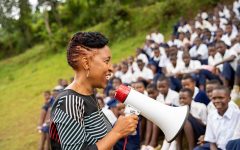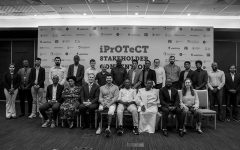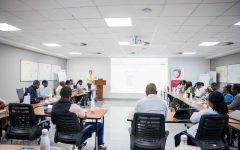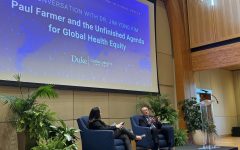WHO Consultant, Claire Kimilu, Applies her MGHD to Tackle Global Cervical Cancer Equitably
January 21, 2021 2021-01-21 11:20WHO Consultant, Claire Kimilu, Applies her MGHD to Tackle Global Cervical Cancer Equitably
When Claire Kimilu began her biology undergraduate degree, she had a set intention – to become a doctor. It had been a narrative she had given herself from an early age, an almost pre-programmed response to every adult’s question of children; ‘What do you want to be when you grow up?’ But this narrative changed when she enrolled in an undergraduate program minor on global health, which introduced her to the social determinants of health and how these impact communities. A seed was quickly planted, which grew into a passion for understanding the links between people’s contextual and lived experiences with the impact on their mental and physical wellbeing. Yet there was one thing missing; learning within the confines of an urban area in the US she was miles from the populations she was studying – and further still from truly understanding the unique contextual challenges faced by vulnerable communities.
UGHE’s unique educational offering addressed this gap. Set high in the hills of rural northern Rwanda, the campus position – and the community partnership this facilitates – serves as a cornerstone of the student learning process; that of applying the practical skills learnt in the classroom to support local communities and, critically, absorbing the unique insights and perspectives offered by leaders in the community, such as community health workers. ‘UGHE offered something different from the masters degrees I’d been exploring in places like the US and Europe’, says Claire. ‘It merges reading and classroom discussion with hands-on, field-based experience, offers an opportunity to learn from the diverse expertise of both faculty and communities, and a chance to expand an understanding of global health equity beyond what you read in medical journals’.

This unique educational approach has laid robust foundations for Claire’s current role: as Consultant at the World Health Organization (WHO). Her team focuses on the elimination of cervical cancer, a complex and ambitious initiative that requires a holistic, evidence-based and human-centered approach from each and every team member involved. ‘In my daily work at the WHO, I see so many different intersections with what we learnt within the MGHD’, explains Claire. ‘My role involves program management support, implementation, qualitative research and health policy, which were all integral elements of our masters curricula.’
Claire feels UGHE’s holistic approach to education has also allowed her to knit together the often-siloed elements of global health such as planning implementation, and impact analysis. Blending intensive mentorship, virtual teaching, field-based learning, and more, the masters curricula has been specifically designed to develop a comprehensive understanding of the broader social, political, and environmental factors, and shape future global health leaders that can meaningfully contribute to multiple areas of health delivery.
Exposed, and aggravated throughout COVID-19, the socio-economic burden on the world’s vulnerable has been a stark wake-up call to find urgent solutions to widespread global health inequities. Aligned with the cornerstone of UGHE’s mission and vision, Claire’s work on cervical cancer is rooted in an equity mission. 85% of cases and cervical cancer deaths occur in low and middle income countries (LMIC) where the death rate is 18 times higher. ‘This disease continues to plague women in vulnerable positions.’ relays Claire, ‘Given its preventability, it is less about whether the treatment and resources exist, rather its threat is intensified when we look at who has access to these tools.’
Within her role, Claire has witnessed acute inequities not only in the disproportionate fatality figures amongst vulnerable women, but also in how cervical cancer screening is offered within different settings. Whilst in many developed countries, lab based screening is widely available, in many low and middle income (LMIC) settings, vinegar screening is widely employed as a means of detecting precancerous changes in the tissue by applying a vinegar soaked cotton swab to the cervix. ‘Why is using vinegar acceptable for some women and not for others?’ questions Claire. ‘It brings us back to the question of equity, and human dignity. This highly-preventable disease is still present because we fail to acknowledge that we are all interdependent; we thrive when everyone thrives. As a team, we seek solutions that are inclusive of all, solutions that are sustainable, evidence-based and rooted in this idea of human dignity.’

This theme of solidarity has been a critical facet of the success of some countries’ response to COVID-19. Many African countries like Rwanda, UGHE’s host country, have proved global predictions wrong by keeping COVID-19 mortality and case rates lower than those in many high-income countries with far fewer resources and facilities. Claire puts this down to the way in which many African countries have prioritized collaboration. ‘The African Union has done a great job of working together.’ she explains. ‘The acknowledgement that we are only as strong as our weakest member of society has been so visible on this continent, and this solidarity needs to continue – not just for the next pandemic, but as a global shift in the way we approach health threats.’ Now, with the next phase of vaccine roll-out, Claire hopes that leaders will recognize the importance of solidarity; after all, we would never have achieved the rapid development of a safe, effective vaccine without the close collaboration between scientists, researchers, vaccinologists, health professionals, governments, pharmaceutical companies and distributors working in tandem on a common goal.
As the first UGHE graduate to work for the WHO, Claire hopes her career trajectory will pave a path for other UGHE students to follow suit. ‘Working at the WHO has been such a humbling experience, and I have tried to carry UGHE values with me in everything I do.’ she says. UGHE, she explains, has given her not only the confidence to ‘make the impossible possible’, but also to be open to listening to the perspectives of others. As a member of a diverse MGHD ‘19 cohort, Claire learnt not only from UGHE’s network of world-class faculty, but also from her student colleagues by embracing the opportunities within collaborative group work. Now, working within a diverse and strongly multidisciplinary team, Claire is not afraid to ask questions to support her learning trajectory around cervical cancer. ‘UGHE has instilled in me the courage to ask questions of those that can fill in gaps, to question the status quo and, critically, to never lose sight of hope.’ she says. ‘I’m so proud to be part of this dynamic community of lions, and its bold, collaborative mission of global health equity’.
***
You can find out more about UGHE’s MGHD program, and how to apply for next year’s cohort here.







